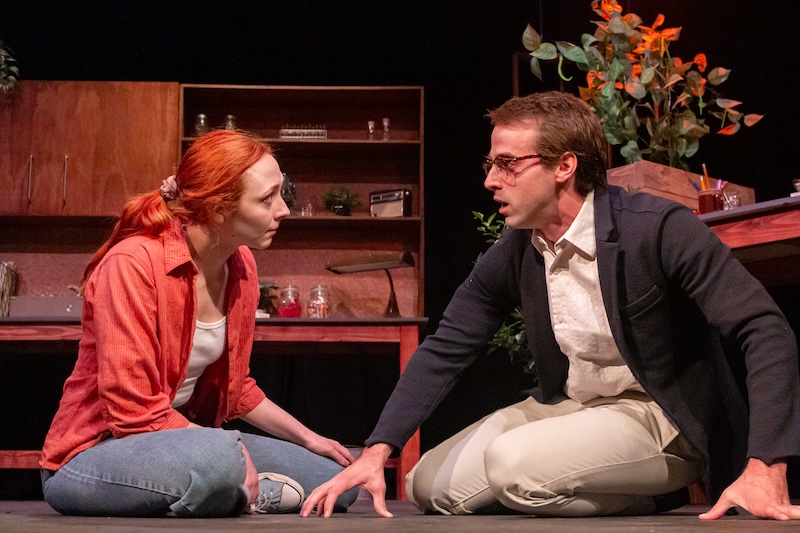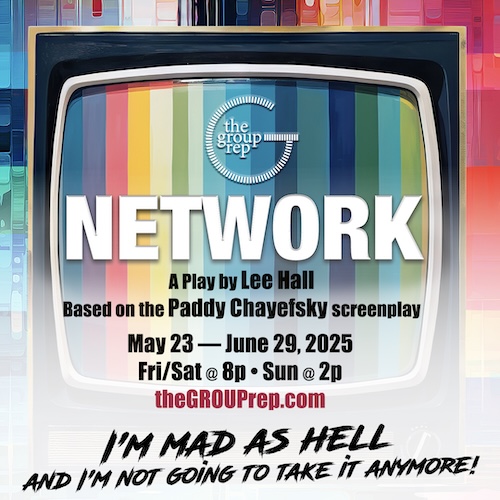
Kat Vanni and Cecil Jennings (Photo by Josh Opper)
Reviewed by Martίn Hernández
Eastwood Performing Arts Center
Through March 23
RECOMMENDED
It is January, 1968. Protests against the Vietnam War — most led by the Students for a Democratic Society (SDS) — have intensified. Columbia University is reaching a boiling point. Adding fuel to the fire is the recent discovery of the University’s connection to the Institute of Defense Analysis (IDA), a think tank doing weapons research for the U.S. Department of Defense. With this burgeoning conflict as the backdrop, playwright Jacqueline Bircher’s dramatically astute but politically naïve work examines how — and if — people with different politics, philosophies and class backgrounds can negotiate their potential conflicts of orbit and own their internal contradictions.
Kat (Emily Vanni), an effusive graduate student, is one of the protestors, and for the last five months she has had solo access to a lab for her uninterrupted studies on the effects of the Earth’s warming climate on certain plants. But when the university assigns Henry (Cecil Jennings), an anxiety-filled scholar doing graduate work in theoretical astrophysics, to Kat’s room, the two immediately clash and things deteriorate from there.
While Henry demands silence when he is working, Kat blasts Jimi Hendrix on her record player or somberly listens to radio news reporting the latest political assassination. Each disdains the other’s fields of study, the scientists they admire and their class backgrounds. Kat also has a brother fighting in Vietnam while Henry has a draft deferment, yet is ambivalent about the war. Still, amidst their political tirades, they find themselves engaging in intense philosophical discussions. Kat expounds on the importance of preserving the planet while Henry marvels at the serendipity of the planet’s creation. These discussions mostly quell their antagonism, even as they compete for the same lucrative fellowship grant. As they negotiate an uneasy truce, however, Kat discovers information about Henry that could destroy their tenuous relationship.
Vanni’s Kat is a budding Earth mother, sympathetic when the closed-off Henry reveals a snippet of personal information and livid when he espouses retrograde opinions she abhors. Henry keeps his pent-up anxiety locked up tight, yet we feel for him as he slowly lets Kat in. William J. O’Donnell’s set exemplifies both characters’ personalities, with Henry’s workspace all books and elaborate equations on a chalkboard while Kat’s worktable is lush with bursting flora. Director Lynch keeps a large void between their two areas, an effective symbol of the physical and psychological distance the characters have put between them.
Having Kat and Henry intermittently read letters to and from family and others time-stamps the scenes and reveals the characters’ feelings and inner turmoil. Indeed, the playwright focuses more on their personal traits than their political choices, an iffy choice for a tale set in such a turbulent political moment, and one that potentially short-circuits intriguing character arcs. Given the current political polarization in this country and around the world — and with seemingly much higher stakes — one wonders if Kat and Henry would draw the same lines today.
Heart of Heart, Theatre Company, Eastwood Performing Arts Center, 1089 Oxford Ave., LA. Open Fri., March 15. Fri.-Sat., 8 pm; thru March 23. Running time: one hour and 45 minutes with an intermission. https://eastwoodpac.stagey.net/projects/10690?tab=tickets











